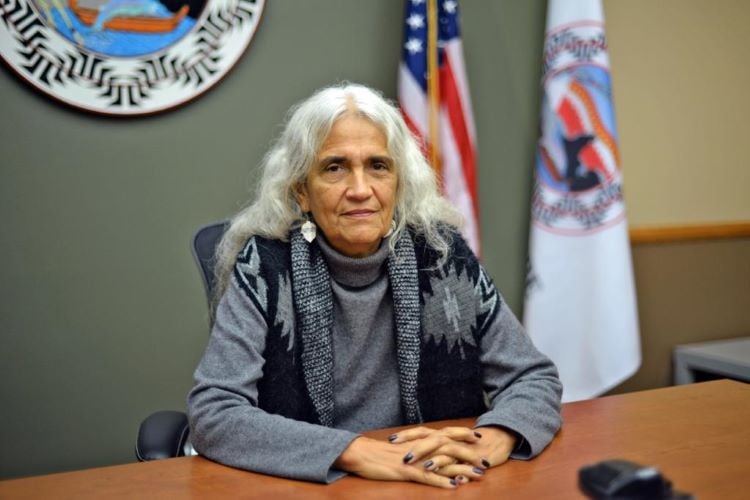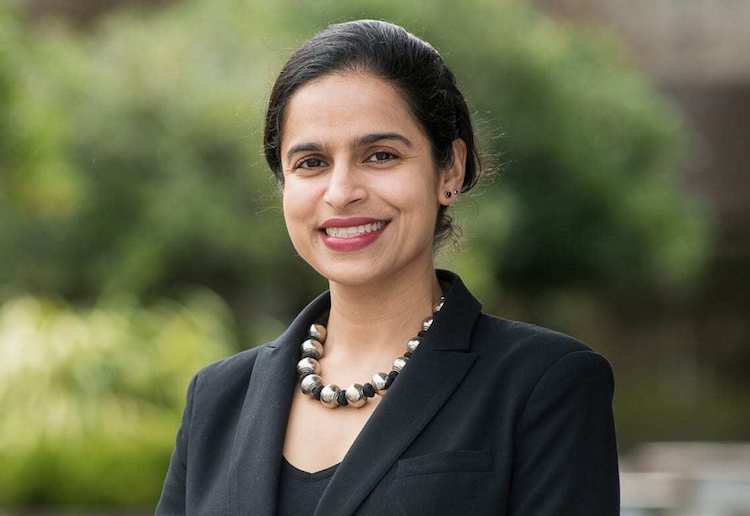Judge discusses negotiating trauma and the law as chief tribal court judge of Yurok Nation

Judge Abby Abinanti served as a judicial officer for the San Francisco Superior Court and has been a Yurok tribal court judge since 1997. Photo by Matt Mais.
Judge Abby Abinanti was the first tribal woman to be admitted to the State Bar of California. For almost two decades, she served as a judicial officer for the San Francisco Superior Court, and Abinanti has been a Yurok tribal court judge since 1997.
In our discussion about negotiating trauma and the law, she speaks about being embarrassed by her own trauma in law school, her resistance to business as usual while on the San Francisco bench, a call against further ecological trauma and decisions about what she did not bring back home to her tribe as she began a culturally powered court program.
Her court’s work acknowledges foundational trauma caused by U.S. settler laws, attempts to remedy current pain through interconnectivity, and it seeks to exemplify a different way of combating harm, historic and current.
Mallika Kaur: Judge, could you share what it was like to be in law school before land acknowledgments became common or Indigenous Peoples Days or Months were recognized?
Abby Abinanti: I did have a lot of difficulties adjusting to law school. I can give you one example: I didn’t have enough money, so I was malnourished and had to go to the hospital. I didn’t want to let my parents know because they didn’t have any money, and I didn’t want to upset them. I was starving to death. It was embarrassing because everybody would come to see me at the student hospital because they had never seen malnutrition there! Then a nurse apparently called the Native American Center at the school and said you better get over here. The director came over and asked “Why did you do this? Why didn’t you come to me?” I didn’t know that there was an Indian Center because the law school was separate. Later he said, “You’re going to go over there every night … and you’ll have dinner over there.” So I did. I had food, and that problem went away. But there were difficulties at the school with the dean. And I didn’t have any friends because I didn’t know anybody till after I knew kids from home [through the Indian Center].
 Mallika Kaur.
Mallika Kaur.
Mallika Kaur: Did you have a clear desire from early on to become a lawyer despite the challenges, foreseeable and unforeseeable?
Abby Abinanti: I never really wanted to go to law school. Three old ladies ganged up on me and said, “Why don’t you go to law school?” I said, “Why would I want to do that?” We had a discussion, which, if you know old Indian ladies, wasn’t really much of a discussion. They said, “You’re the only one graduating, and we need a lawyer.” Now that I’m an old lady, I don’t really mind that part!
Mallika Kaur: As somebody who mentors others going to law school, what advice do you give them about how they negotiate their identity, how they think about “the law,” from legacies of settler colonialist laws to inequitable laws of 2022, but also the promise of the law?
Abby Abinanti: I tell them, you just got to do this and come home. Know what you can bring home and what you need to not bring home now. You could do a lot of good. We’ve got to be able to negotiate this. And we’ve had some great victories with some of our young lawyers. We’re going to have the biggest dam removal project in the world, and a young lawyer from here, Amy Cordalis, led that. I mean, what could be better? And there’s a lot to be done …. You know, we survived. We ran and hid [from the White colonists], and that was good. And I’m not criticizing anybody about that strategy, but it won’t work now. Because they basically junked the place up in 170 years. We didn’t junk it up in thousands of years. There’s no place to run and hide again, so we have to have a different strategy. We have to help them understand place. This is your homeland. It’s your responsibility.
Mallika Kaur: That relationality to place and to people is in contrast to the majoritarian culture. What was it like for you to serve as a commissioner in the San Francisco court culture?
Abby Abinanti: Well, [the U.S. courts] are very right-spaced. We’re responsibility-based. So naturally, you’re going to have different practices coming out of those two systems because we have different value systems. Sometimes people would say, “Well, you’ve got to do this,” and I’m like, “No, I don’t have to and I won’t.” I once had a kid before me, some 11-year-old, and he’d gotten into a school fight. They locked him up over the weekend. He was just a scrawny little kid in juvenile hall in San Francisco, and his whole family—his uncles, his father, everybody—was in there on Monday morning. They had charged him with some felony. He had been locked up three to four days by then. And when the DA talked about the charges, all heated up, I said, “OK, let me explain something to you: It’s not a felony. He didn’t have a gun. And he isn’t even tall enough to ride the teacup rides in Disneyland. Do you understand me?” And when they started disagreeing, I said, “OK, well, that’s what the appellate courts are for. Step back.” And then I asked the kid to stand up and said, “Look behind you. Your father’s here, your uncles are here. And none of them spent the weekend in jail. So the next time you get a really stupid idea, go to the principal’s office and call them and ask them what you should do, because they obviously know what to do and you obviously did not know what to do. And your mother’s crying; is that really what you want?’ I said, “I’m gonna send you home, and I never ever want to see you again.” And I didn’t.
Mallika Kaur: Are there particular practices that help sustain you in the very intense work both inside and outside your tribe?
Abby Abinanti: At my age, you have—essentially, we have—the culture. When I was very young, the dances started to come back. The culture started to come back. [Before then], we had to hide the regalia and dance sites. The language has come back and now it’s being taught in the schools. I really regret not knowing my language. Before COVID, I had hired a seventh grader to be my tutor, but I didn’t want her to keep coming because I was afraid for her health. So now I’ll probably get another tutor to help me.
Mallika Kaur: Do you speak with your staff about how they handle their own emotional reactions to the work, any vicarious or secondary trauma?
Abby Abinanti: We talk to each other. We go dance together, do cultural activities together. And it’s like everybody knows where Judge Abby is. Everybody knows what I’ve done and the trouble I got into when I was younger or didn’t get into. Our dance families are increasingly strong. You know, they’re the cultural leads. We have people from the dance families who work in the court who talk to each other. Someone might say, “Oh, Judge Abby, you look tired, so I’m going to bring you some root to burn.” So I say, “Thank you; that’s really nice of you, that helps.” It’s a more of a family.
Mallika Kaur: The Violence Against Women Act’s recent reauthorization carries unprecedented funding for tribal nations. You have already been doing pioneering projects against domestic violence in your tribe; what do you hope to further amplify?
Abby Abinanti: Our tribe has the only state-certified batterer intervention program of any tribe. I did it because … I’m responsible for both sides of the problem here. Basically, I know the traumas. The three traumas for our people: indentured as slaves, boarding schools and the massacres. We began to ask, “Which of those happened to your family?” because that’s where that behavior came from. It’s a very long process, but it’s been very interesting for people to understand because a lot of times, they don’t understand why they’re doing it. The first thing is conveying [domestic violence] is not acceptable. Then, two, where did it come from? And three, how are we going to stop it?
Mallika Kaur: How do you balance gaining attention to the challenges, for example, parts of the reservation are not yet connected to electricity, while not encouraging the type of trauma voyeurism that people from outside sometimes engage in while approaching tribes?
Abby Abinanti: I think you just go through your day and do the best you can. And you help them. You let them see the people because the people are strong, and they’ve lived through a lot. We were never unfriendly, so we always had interaction. We still do try to welcome people. We have a lot of visitors that come to the court. We try to talk with them and share our systems, and more and more of the other systems are copying component parts of ours because they see that it works and we make that available to them. Some people struggle with their own trauma and they don’t recognize it; that’s part of what gets in their way. I try to help people reinforce bonds with others and reconnect because it will really help.
Mallika Kaur is a lawyer and writer who focuses on human rights, with a specialization in gender and minority issues. She is the author of the new book Faith, Gender, and Activism in the Punjab Conflict: The Wheat Fields Still Whisper. She teaches social justice classes at the University of California at Berkeley School of Law.



